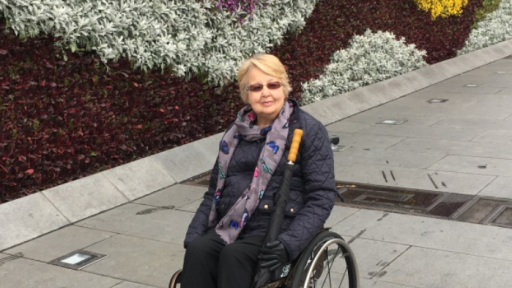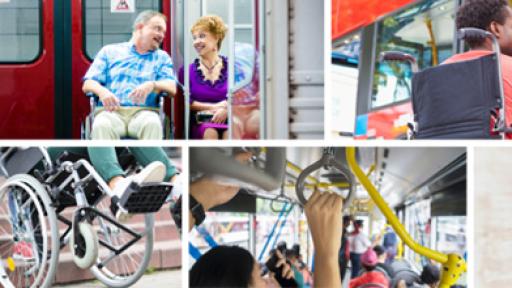The symptoms of MS can sometimes interfere with your daily life and make previously straightforward tasks more challenging. The right tools or equipment can help you overcome some of those barriers.
Here, we look at what may be available and how equipment may help you with performing daily tasks, getting around or continuing with work, hobbies and pastimes.
In most cases, you'll need to speak to a health or social care professional first. An occupational therapist can assess your home or workplace and can make recommendations for useful equipment that may benefit you to support you with everyday life. You could also speak to your MS nurse, your GP or a physiotherapist about your needs. They may be able to refer you for specialist support.
What kind of equipment exists for people with MS?
As a person living with MS, you may be entitled to free disability equipment or small home adaptations which can be supplied by your local council. Aids and adaptations costing less than a thousand pounds (such as handrails and furniture raisers) will be provided by the local adult social care services. These independent living aids will likely be provided free if you are in England or Scotland but if you are in Wales or Northern Ireland there may be a charge.
If you think you could benefit from some specialised equipment or other help at home, start by requesting a free care needs assessment from the social services department of your local council.
The links on this page can help you find information and advice on choosing the right equipment to help and support your situation and your personal preferences as well as where to look and who to speak to.
For larger home adaptations to make life easier, such as having a doorway widened or a wet room installed, there may be financial help available to meet the costs. You may be entitled to a Disabled Facilities Grant, which would help you pay for these adaptations. You can read about this grant and other agencies that can help in our webpage on housing adaptations.
Mobility equipment and walking aids
MS symptoms such as balance problems, muscle stiffness or weakness, fatigue and pain can make walking difficult. Using a mobility aid can give you back your freedom to get around independently. From a walking stick to a full powered wheelchair, there are a range of solutions for all levels of ability. In all cases, getting a needs assessment from an occupational therapist is recommended, to make sure you have the right mobility aid for you.
You can speak to a GP, your MS nurse, physiotherapist or hospital staff about obtaining a walking aid. You might have to pay a small deposit. You can buy walking sticks online or from mobility shops and you can search online for mobility shops in your area.
The most common types of walking aids that may benefit people living with MS are:
- A walking stick or walking cane can help with balance issues and give you confidence when out and about, so you have something to keep you steady, particularly on uneven surfaces. Walking canes and sticks can also assist in maintaining good posture, which can prevent further pain or disability developing. They come in many sizes and designs, including foldable ones, different handle shapes and sizes to match your height.
- A walking frame can provide increased stability and balance, reducing the risk of falls and injuries. A rollator is a walking frame with wheels, and might be recommended for you. Rollators and walking frames are often lightweight and easily manoeuvred indoors and outdoors. Many rollators also come with a built-in seat, allowing you to take a break and rest whenever needed. They usually contain a basket or pouch which enables you to carry personal items with you.
- A mobility scooter is usually cheaper than a powered wheelchair and can be a little easier to move across uneven ground. It can also be customised to your needs. Scooters are designed for people who have trouble walking or getting around, but don't always need a power wheelchair. They can be handy for popping to a local shop or a day out to help if you have fatigue or other mobility problems.
- A wheelchair can provide mobility, postural support, and freedom if you cannot walk or have difficulty walking unaided. Many people find that the right wheelchair gives a sense of freedom, enabling you to get around and participate in everyday activities. Wheelchairs can be self-propelled or electric, and can come in a wide variety of formats to meet your needs. A self-propelled wheelchair needs to be pushed either by the wheelchair user themselves or an assistant. An electric wheelchair is powered provided by batteries and electric motors, and may need charging at home.
The following professionals and organisations can help you find information and advice on choosing the right equipment for your situation and your personal preferences.
- The Disabled Living Foundation is a charity that provides impartial advice on disability equipment, day-to-day household gadgets, new technologies and training techniques. Their Living Made Easy website has a wide range information about daily living equipment and other aspects of independent living.
-
Disability Living Centres and Independent Living Centres are local services that offer a display of equipment that you can try out as well as information about what is available to help you. They are listed in our map of MS services.
-
RIDC is an independent research charity that publishes practical and unbiased guides on a range of household and mobility items for people with a disability.
- AbilityNet is a charity that offers free information and advice about finding and adapting IT equipment, such as computers, tablets and mobile phones. AbilityNet can advise employers on accessibility and assistive technology appropriate to the needs of people with a disability. They also have a network of volunteers who can visit and help you set up your home computer equipment to make it easier to use if you have dexterity, visual, hearing or cognitive problems.
-
Occupational therapy aims to help people continue to live life as fully as possible by making suggestions for changes in lifestyle, or useful equipment and adaptations. Initially, a GP or neurologist can refer you to an occupational therapy service. Some OTs work outside health and social services, so they may have a shorter waiting list but will charge for their services.
- Depending on your location, referrals to a local NHS Wheelchair Service can be made by your hospital, GP, consultant, or occupational therapist. Some services may allow you to refer yourself.
Renting or buying accessibility equipment
Here are a few organisations that provide adapted and accessible equipment for the home and for getting out and about. You'll find rental schemes as well as options to purchase equipment.
Sport and leisure equipment
If you join a club for a particular sport such as sailing or bowls, the club leaders will be able to direct you to equipment that can make it easier for you to take part. For example, modified walking frames to allow you to walk on a bowling green without leaving holes in the turf, or buoyancy aids that you can easily get on and off.
The following organisations also sell or compare sports and leisure equipment for those with mobility or dexterity problems, or other disabilities. They include everything from scissors with a comfortable grip and large format playing cards through to hand-propelled tricycles.
Here are a few organisations that provide clothing that has been adapted for people with dressing difficulties, or those who habitually use a wheelchair. An article in the Guardian newspaper drew attention to a number of mainstream designers who are also now designing clothes for a seated position, with waistbands that don't ride up, and tops cut shorter at the back so they don't bunch uncomfortably.


